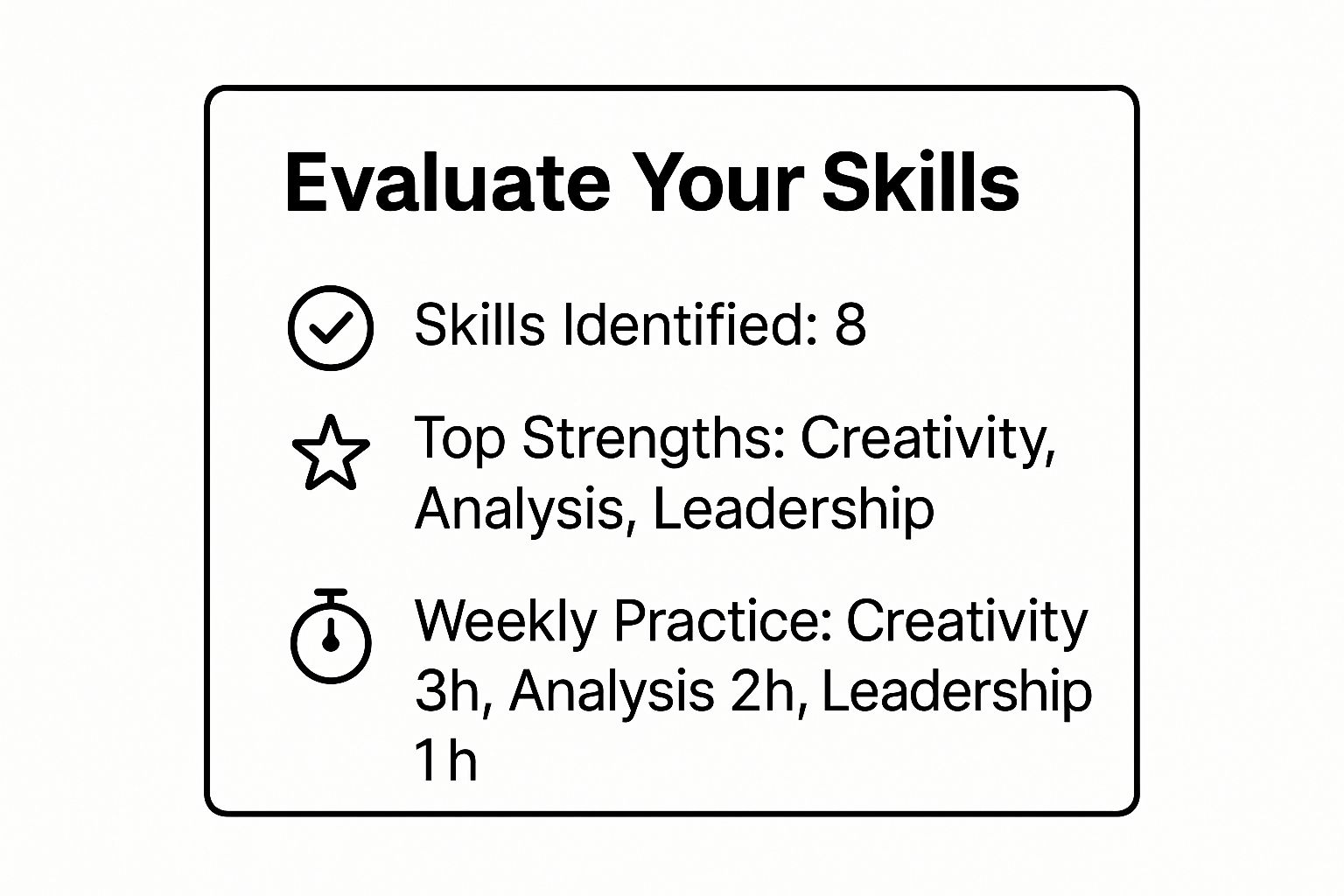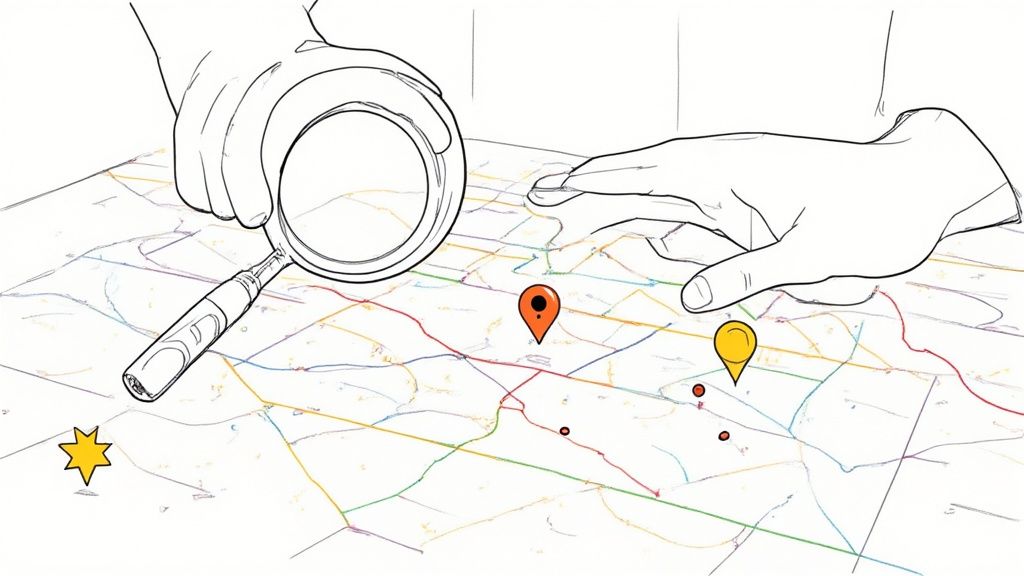What Passion Really Means (Beyond the Clichés)

The word "passion" is everywhere. We see it on posters, hear it in speeches, and it's often presented as the ultimate key to a happy life. But what does passion truly mean? Let's explore the authentic meaning of passion and how you can discover yours.
Passion as a Process of Self-Discovery
Finding your passion isn't a sudden revelation. It's a journey of self-exploration. This journey involves understanding your values, recognizing what truly captivates you, and accepting that your passions can change over time. You might begin with a love for photography, for example, and later find yourself drawn to visual storytelling through filmmaking.
Being open to change and new experiences are essential parts of this process. This journey can take years, constantly evolving as you grow and learn. One researcher's journey began in 1999 after graduation, continuing through graduate school and various coaching roles, with ongoing self-discovery between 2006 and 2008. This demonstrates how passions can evolve and shape meaningful careers.
Passion is often defined as activities that bring joy and intrinsic motivation, leading to greater job satisfaction. Learn more about this fascinating journey. When your work aligns with your interests, it can dramatically impact your overall happiness. Studies show that intrinsic motivation significantly contributes to job satisfaction. In fact, 80% of workers worldwide report enjoying their work, a testament to the power of aligning passion with profession.
Understanding Intrinsic Motivation
Intrinsic motivation is at the heart of true passion. It's the drive that comes from within, not for external rewards or recognition. Consider what you do simply for the pure enjoyment of it, without needing external validation. These are often clues to your true passions.
Also, pay attention to what puts you in a flow state. That's the feeling of being completely absorbed in an activity, losing track of time, and experiencing effortless focus. This state of flow is a powerful indicator of where your passions might lie.
Aligning With Your Core Values
Your passions are often deeply connected to your core values. These are the fundamental beliefs that shape your choices and actions. When you engage in activities that resonate with your core values, you experience a deeper sense of meaning and purpose.
Identifying these values requires introspection and honesty. Ask yourself: What truly matters to you? What principles guide your life? By aligning your passions with your values, you build a foundation for a life that feels authentic and fulfilling. This alignment is crucial for long-term satisfaction, helping you stay motivated even during challenging times.
The Myth of Finding Your 'One True Calling'

Many people feel pressured to find that single, all-consuming passion—their "one true calling." This societal expectation can feel overwhelming, leading to a fear of choosing the "wrong" path. This infographic summarizes key points on embracing multiple passions. The key takeaway? You don't have to limit yourself!
This section explores why embracing multiple passions is not only acceptable but often the key to a more fulfilling life. Let's break free from this limiting belief and discover the joy of pursuing diverse interests.
Exploring Multipassionate Professionals
Think about successful individuals in various fields. Many integrate several passions throughout their lives. A software engineer might also be a passionate musician, expressing creativity through both code and melody. A teacher might also run a small baking business, nurturing both minds and appetites.
These examples illustrate how passions can complement and enrich each other. They don't have to compete. You don't have to pick just one thing and stick with it forever. Your interests can evolve, and you can weave them together in wonderfully creative ways.
This realization can be incredibly liberating. It frees you from the anxiety of picking the "perfect" path and allows you to explore multiple avenues with joy and curiosity.
The Evolution of Passion
Passions aren't static; they change and grow with us. What excites you in your 20s might be different from what fuels you in your 40s. This evolution is natural and beautiful.
The pursuit of passion is a lifelong journey of discovery, not a final destination. Embracing this fluidity allows you to adapt to different life stages and experiences. It also opens doors to unexpected opportunities and helps you cultivate a diverse skill set.
Let's explore the benefits and limitations of focusing on a single passion versus embracing multiple interests with the following comparison table.
To help understand the different approaches to passion, let's look at the following table:
Single Passion vs. Multiple Passions Approach
| Aspect | Single Passion Approach | Multiple Passions Approach |
|---|---|---|
| Focus | Deep expertise in one area | Broad range of skills and knowledge |
| Risk | Putting all eggs in one basket | Diversified interests, less risk of burnout |
| Fulfillment | Potential for mastery and deep satisfaction | Wider exploration, varied sources of joy |
| Adaptability | May struggle with career shifts or changes in interest | More adaptable to changing circumstances |
| Creativity | Can lead to innovation within a specific field | Cross-pollination of ideas, sparks new creative endeavors |
This table highlights the key differences and similarities between these two approaches. While a single passion can lead to deep expertise, multiple passions offer greater adaptability and a wider range of fulfillment.
Key Takeaways: Embracing Multiple Passions
Here's a quick reference for navigating the multiple passions approach as you continue on your path:
- Don't Limit Yourself: You are capable of embracing more than one passion.
- Embrace Change: Your passions will evolve and grow over time. Allow yourself to explore those changes.
- Find Connections: Explore how your passions complement and enrich one another. You might be surprised at the beautiful tapestry you can create.
- Flexibility is Key: Be open to new interests and opportunities as they arise. Adventure awaits!
This more holistic approach empowers you to integrate all facets of your personality and interests into a rich, fulfilling life. Next, we'll explore how your cultural background can influence how you view and approach your passions.
How Culture Shapes Your Passion Discovery

Your cultural background profoundly influences how you see the world, including your passions. It shapes your understanding of what society deems a worthwhile pursuit, impacting your self-perception and the opportunities you feel are within reach. This section explores how cultural narratives impact the journey to discover your passion.
The Influence of Individualistic Vs. Collective Cultures
Cultural values significantly affect how we approach our passions. In individualistic cultures, like the United States, pursuing personal interests is highly encouraged, emphasizing self-reliance and achieving individual success. This creates an environment where following one's passion is seen as a key to career fulfillment.
However, collectivist cultures prioritize community and interdependence. They may place less emphasis on individual passions, especially if they don't directly benefit the group. Fulfilling family obligations or contributing to the community often takes precedence. This contrast highlights how culture shapes our understanding of passion and its pursuit.
Cultural nuances also influence how people approach discovering and pursuing their passions. In the United States, with its emphasis on individual independence, there’s a strong cultural narrative around following one's passion for career fulfillment. Americans often view passion as inherently motivating and anticipate positive outcomes from pursuing it.
Conversely, in cultures that prioritize community over individual pursuits, like Singapore, there can be more skepticism about the potential outcomes of following a passion. Individuals may view passion as potentially problematic, highlighting how cultural context influences career choices. This cultural variation underscores the need for personalized approaches to discovering passion, balancing individual interests and societal norms. Explore this further here.
Family Expectations and Educational Conditioning
Our families and educational systems further mold our understanding of acceptable passions. Family expectations, though usually well-intentioned, can sometimes guide us toward paths that don't resonate with our true interests. For example, a family might encourage a child toward a stable career in medicine, even if the child's true calling lies in the arts.
Educational systems can also emphasize certain fields over others. This can lead us to believe some passions are more "valuable," influencing our choices subconsciously. This conditioning can limit our exploration of diverse interests, potentially diverting us from our true passions.
Navigating Economic Realities and Cultural Narratives
Economic realities also play a significant role. Some cultures prioritize financial stability above all else. This can make pursuing less conventional passions feel risky or impractical, leading to internal conflict where individuals feel torn between following their heart and meeting societal expectations.
Certain cultural narratives might also associate specific passions with particular genders or social classes. These narratives can create barriers for individuals who don't fit those preconceived notions. Overcoming these limitations requires challenging ingrained beliefs and embracing diverse expressions of passion.
Taking Control of Your Passion Discovery
Discovering your passion requires awareness of these cultural influences. By understanding how your background shapes your perspective, you can begin to separate external pressures from your authentic interests.
This awareness empowers you to make conscious choices aligned with your true self, rather than unconsciously following cultural norms. Discovering your passion becomes a journey of self-discovery, free from societal expectations. It's about identifying what truly excites and motivates you, regardless of external pressures. This allows you to create a path that is both fulfilling and authentically yours.
Practical Exercises That Actually Uncover Passions
Discovering your passion isn't about magically finding your "one true calling." It's about actively exploring yourself. These practical exercises, based on real-world experience and proven methods, can help you uncover your passions.
Analyzing Peak Experiences
Peak experiences are moments of intense joy, flow, and fulfillment. These moments, big or small, hold valuable clues to your passions. Remember times you felt truly engaged and energized. Maybe it was while coding, playing music, or organizing a community event.
-
Step 1: Recall and Record: Write down 5-10 peak experiences. Be specific, describing what you were doing and how you felt.
-
Step 2: Identify Patterns: Look for recurring themes or activities. Do you see a pattern of creative expression, problem-solving, or helping others?
-
Step 3: Explore Further: Research related activities or fields that resonate with those patterns. For instance, if you enjoyed mentoring a colleague, explore coaching or leadership roles.
This exercise helps you identify activities you're already passionate about, providing a starting point for further exploration.
Structured Reflection Practices
Regular reflection can reveal hidden passions by increasing self-awareness. This doesn't require hours of meditation. Short, focused reflections can be very insightful. Here's a simple method:
-
Daily Reflection: At the end of each day, ask yourself: What activity gave me the most energy today? What sparked my curiosity?
-
Weekly Review: Each week, review your daily reflections. What activities consistently bring you joy or a sense of accomplishment?
-
Monthly Analysis: At the end of the month, analyze your weekly reviews. Are there any emerging patterns pointing to a deeper passion?
This structured approach helps you track your experiences and identify energy-giving activities. These activities, often overlooked in daily life, can hint at underlying passions.
Passion Sampling: A Hands-On Approach
Passion sampling means actively trying new activities to broaden your horizons and discover hidden interests. Think of it as a taste test for different passions.
-
Create a List: Brainstorm activities you’re curious about, even if they seem outside your comfort zone.
-
Schedule Time: Dedicate specific times each week to sample these activities. It could be anything from a pottery class to volunteering.
-
Track Your Experience: After each activity, note how you felt. Did it energize or drain you? Did it spark further curiosity?
Passion sampling gives you valuable data about your responses to different activities. It's a proactive way to discover your passions.
Following Curiosity Trails
Curiosity is a powerful compass, guiding you toward your passions. Pay attention to what piques your interest – a topic, a skill, or even a certain type of person.
-
Identify Your Triggers: What topics or questions do you constantly think about? What kind of information draws you in?
-
Follow the Thread: When something sparks your curiosity, pursue it. Read, watch documentaries, attend workshops, or connect with people who share that interest.
-
Document Your Journey: Keep a journal to track your exploration. This helps you see connections between your interests and recognize emerging patterns.
By following these curiosity trails, you might discover hidden passions. This exercise turns passive curiosity into active self-discovery.
To help illustrate the effectiveness of these exercises, let's take a look at the following table:
Passion Discovery Exercises Effectiveness
Assessment of different passion-finding methods and their outcomes based on user experiences.
| Exercise Type | Time Investment | Effectiveness Rating | Best For |
|---|---|---|---|
| Analyzing Peak Experiences | Low (a few hours) | Medium | Identifying existing passions |
| Structured Reflection Practices | Low (5-10 minutes daily) | High | Developing self-awareness |
| Passion Sampling | Medium (a few hours weekly) | High | Exploring new interests |
| Following Curiosity Trails | Variable (depends on the topic) | Medium-High | Deepening existing interests |
This table summarizes the time commitment and potential effectiveness of each exercise, suggesting which method might be best suited for different individuals. As you can see, even small investments of time in self-reflection can yield significant results in uncovering your passions. By actively engaging in these exercises, you'll be well on your way to discovering what truly ignites your soul.
Making Passion Work in the Real World

Discovering your passion is an incredible journey. But turning that inner spark into a fulfilling life takes practical steps. This means exploring how your interests can weave into your career, facing financial realities, and building a supportive community around you.
Integrating Passion Into Your Existing Career
Changing careers can feel daunting. But bringing your passion into your work life doesn't necessarily mean a dramatic leap. Begin by noticing where your current role and your interests overlap. For example, a passion for writing in a marketing job could lead to exciting opportunities creating compelling content. Also, look for projects that let you use those passion-fueled skills.
Professional development is another powerful pathway. Think workshops, online courses, or even shadowing colleagues in other departments. These experiences can bridge the gap between your current skills and your dream career, letting you grow within your current role while building expertise related to your passion.
Creating Sustainable Side Projects
Side projects are a fantastic way to explore your passions without leaving your current job. They provide a low-risk environment to develop skills, gain experience, and test your ideas. If photography is your passion, starting a freelance photography business on weekends could be a great first step. Just as with uncovering your passion, finding startup ideas can be incredibly helpful for exploring interests.
This lets you experience the realities of turning your passion into a potential career, offering valuable lessons before making a full-time commitment. Plus, a successful side project can create extra income, providing financial security during a career transition. This measured approach can ease financial worries that often accompany big career changes.
Gradual Transitions Toward Fulfilling Work
A gradual transition offers balance, letting you embrace your passion while maintaining financial stability. This could mean taking on part-time work related to your passion or gradually shifting responsibilities in your current role. It's a way to test your commitment before fully diving in.
Gradual transitions also give you time to build a professional network in your desired field. This opens doors to new opportunities and provides support during your career shift. This approach minimizes disruption and allows a smoother adaptation to a new path.
Passion as a Career vs. Meaningful Hobby
Some passions naturally evolve into careers. Others thrive as enriching hobbies. This depends on several factors: financial viability, market demand, and personal preferences. Understanding this can manage expectations and reduce potential frustration. For example, a passion for collecting rare stamps might not support a full-time career.
But as a hobby, it can bring immense joy and fulfillment without the pressure of financial dependence. Honestly evaluating the possibilities of monetizing your passion is key. This means market research, assessing your skills, and considering the long-term sustainability of a passion-based career. While many believe passion is key to job satisfaction, research shows it's more nuanced. A major study reviewed over 60 research papers and found that six key ingredients contribute to a fulfilling job: meaningful work, autonomy, variety, cooperation and mutual respect, fair pay, and strong personal and professional growth opportunities. Learn more about job satisfaction. Finding the right balance between passion and practicality is essential for a fulfilling and sustainable life.
Breaking Through Your Passion Roadblocks
Discovering your passion can feel like a challenging journey. Often, the biggest hurdles aren't external circumstances, but internal roadblocks we unknowingly create for ourselves. This section explores common psychological barriers that hinder passion discovery—fear of failure, perfectionism, imposter syndrome—and offers strategies for overcoming them.
Confronting the Fear of Failure
Fear of failure can be a significant obstacle. It whispers doubts, making us question our capabilities and hesitate to even begin. This fear can manifest as analysis paralysis, where overthinking every possibility prevents us from taking action. But what if we reframed failure as a valuable learning experience? Every "failed" attempt offers insights, guiding us closer to what truly resonates. Embracing experimentation allows us to learn and grow, transforming perceived setbacks into opportunities for self-discovery.
Overcoming Perfectionism
Perfectionism sets impossibly high standards, leading to feelings of inadequacy. This constant pursuit of flawlessness can stifle creativity and discourage us from exploring new interests. Remember, discovering your passion is a journey, not a destination. It’s about exploration and experimentation, not instant expertise. By prioritizing progress over perfection, we liberate ourselves to try new things without the fear of not being "good enough." This shift in mindset allows for genuine exploration and opens doors to unexpected passions.
Silencing Imposter Syndrome
Imposter syndrome convinces us that our accomplishments are unearned, fueling self-doubt and undermining our confidence. This feeling of being a "fraud" can prevent us from pursuing our passions, making us believe we're not qualified or capable. However, recognizing imposter syndrome as a common experience can be empowering. By acknowledging these feelings and focusing on our strengths and past successes, we can build genuine confidence and silence the inner critic holding us back.
Distinguishing Between Practical Constraints and Self-Imposed Limitations
Sometimes, legitimate constraints such as time or finances limit our options. However, we often create self-imposed limitations based on unfounded beliefs or societal expectations. If you're seeking a career with flexibility and location independence, exploring Work from Anywhere Jobs can be a way of aligning your career with your passions. Learning to differentiate between real obstacles and perceived barriers is crucial. Honest self-assessment, combined with exploring alternative solutions, helps us expand our possibilities and move beyond self-imposed boundaries.
Expanding Your Horizons Despite Limitations
Even with limitations, there are ways to explore your passions. Think creatively. Could you dedicate 30 minutes each day to pursuing an interest? Could you barter skills or find free online resources? Even small steps can build momentum and uncover new avenues for exploration. If finances are a constraint, explore free online courses or workshops related to your interests. If time is limited, break down your passion into smaller, manageable steps you can incorporate into your daily routine. By embracing resourcefulness and adapting our approach, we can overcome perceived limitations and create opportunities for growth, even amidst constraints.
Separating Your Desires From External Expectations
Societal pressures, family expectations, and cultural norms can significantly influence our choices. Discovering your true passion requires separating your genuine desires from what others expect of you. This takes courage and introspection. Ask yourself: "What do I truly want?" By prioritizing your own values and aspirations, you create a path aligned with your authentic self, leading to greater fulfillment and a stronger sense of purpose. This act of self-definition empowers you to break free from external pressures and create a life aligned with your unique vision. This process isn't about rejecting external influences entirely, but about consciously choosing which ones to embrace and which ones to challenge, creating a life that is both meaningful and authentically yours.
Building Your Personal Passion Roadmap
Discovering your passions is a significant first step. But turning those sparks of interest into meaningful action? That takes a roadmap. This section provides the framework for building your personalized passion roadmap, guiding you from initial curiosity to tangible achievement.
Prioritizing Your Passions
You've likely uncovered multiple potential passions. Prioritizing them helps you focus your energy and avoid feeling overwhelmed. Ask yourself: Which passions resonate most deeply? Which ones align with your values and long-term goals? For example, if you love both photography and writing but dream of being a photojournalist, photography might take precedence.
Prioritization isn't about abandoning passions. It's about strategically investing your time and energy where it matters most. This focus allows you to cultivate expertise and make real progress towards your aspirations. The result? More significant accomplishments and a deeper sense of fulfillment.
Setting Realistic Timelines
Enthusiasm is fantastic, but sustainable progress requires realistic timelines. Consider your current commitments—work, family, and other responsibilities. Then, carve out dedicated time slots for pursuing your passions. Perhaps it's an hour each evening for writing, or a weekend workshop for pottery. Remember, consistency, even in small increments, is the key. Think marathon, not sprint.
Creating Meaningful Milestones
Break your passion roadmap into smaller, achievable milestones. This creates a sense of accomplishment and fuels motivation. Instead of aiming to "write a novel," focus on completing a chapter each week. If learning a new language excites you, aim to master a set number of vocabulary words each month. These small victories provide a tangible sense of progress and propel you forward.
Identifying Resources and Support
What resources will you need along the way? Do you need specific equipment, online courses, or access to a particular community? Research available resources, both free and paid. Explore online communities, local workshops, and mentorship programs. Building a support network of like-minded individuals offers encouragement and accountability. Sharing your journey with others creates a sense of belonging and helps you navigate challenges.
Maintaining Momentum and Adaptability
Passion journeys rarely follow a straight line. There will be setbacks, challenges, and moments of doubt. Develop strategies to maintain momentum. This might involve revisiting your initial inspiration, connecting with your support system, or adjusting your timelines and milestones. Remember, your roadmap is a living document, designed to evolve with you. Embrace change and allow your passions to unfold naturally.
Measuring Your Progress and Celebrating Successes
Measuring progress is essential for motivation and recognizing your achievements. Define "progress" in ways that are personally meaningful. It doesn't always require external validation. Completing a short story, mastering a new technique, or simply enjoying the process can be significant milestones. Celebrate these successes, no matter how small. These celebrations reinforce your commitment and fuel your journey forward.






